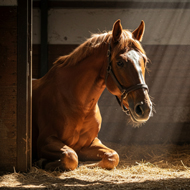Equine charities share compassionate handling framework
Appropriate handling protects equines' physical and psychological health.
Working animal charity Brooke has collaborated with Redwings Horse Sanctuary to share its Compassion Handling Mentorship Framework.
From 18 August to 22 August 2025, veterinary surgeons and animal welfare experts were invited to Redwings’ Norfolk headquarters to learn improved handling practices for horses, donkeys and mules.
Brooke’s Compassionate Handling Mentoring Framework is designed to support those working with animals to respond and interact with equines in a compassionate and effective way. It explains the importance of appropriate handling, not only to protect the animal’s physical health but also to safeguard its psychological wellbeing.
The charity uses the framework to educate animal health practitioners and local communities on appropriate handling techniques. It is also integrating handling into systems and institutions, such as World Organisation for Animal Health Terrestrial Code.
As part this mission, the charity invited veterinary surgeons and other experts for a practical training session in Norfolk.
Attendees took part in practical demonstrations, workshops and theory sessions to improve their handling techniques. They also received a tour of Redwings’ facilities, which include a Horse Hospital and Behaviour Centre.
Redwings cares for over 2,000 rescued horses, ponies, donkeys and mules in the UK. As a result of their traumatic histories, these equines sometimes have challenging behaviours.
Nic de Brauwere, head of welfare and behaviour at Redwings, said: "By the end of day one, we had already learned how similar some of the challenges are for equines who suffer from poor mental health wherever they are in the world, and that by understanding their behaviour we can give them a better life.”
Jen Wathan, global animal welfare advisor at Brooke, said: “We’re so grateful to Redwings for allowing us to spend time with their in-house vets and behaviour experts, as well as their horses and donkeys.
“It was brilliant to see how they (Redwings) work with their equines, many of whom have had experiences that have significantly affected their behaviours, and learn how they manage these with compassion.”
Learn more about Brooke's Compassionate Handling Mentoring Framework here.
Image © Redwings



 Zoetis UK has called on horse owners to complete a short online survey about their horse's behaviours.
Zoetis UK has called on horse owners to complete a short online survey about their horse's behaviours.